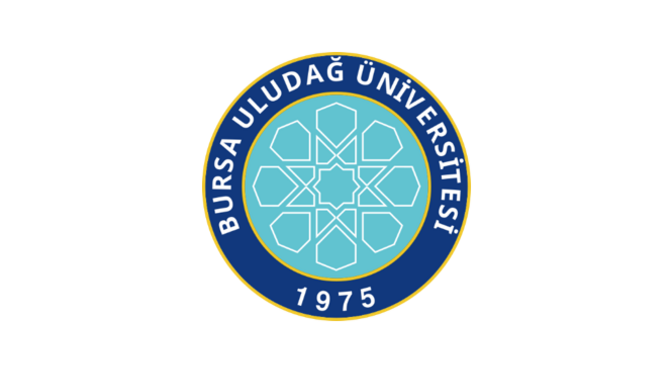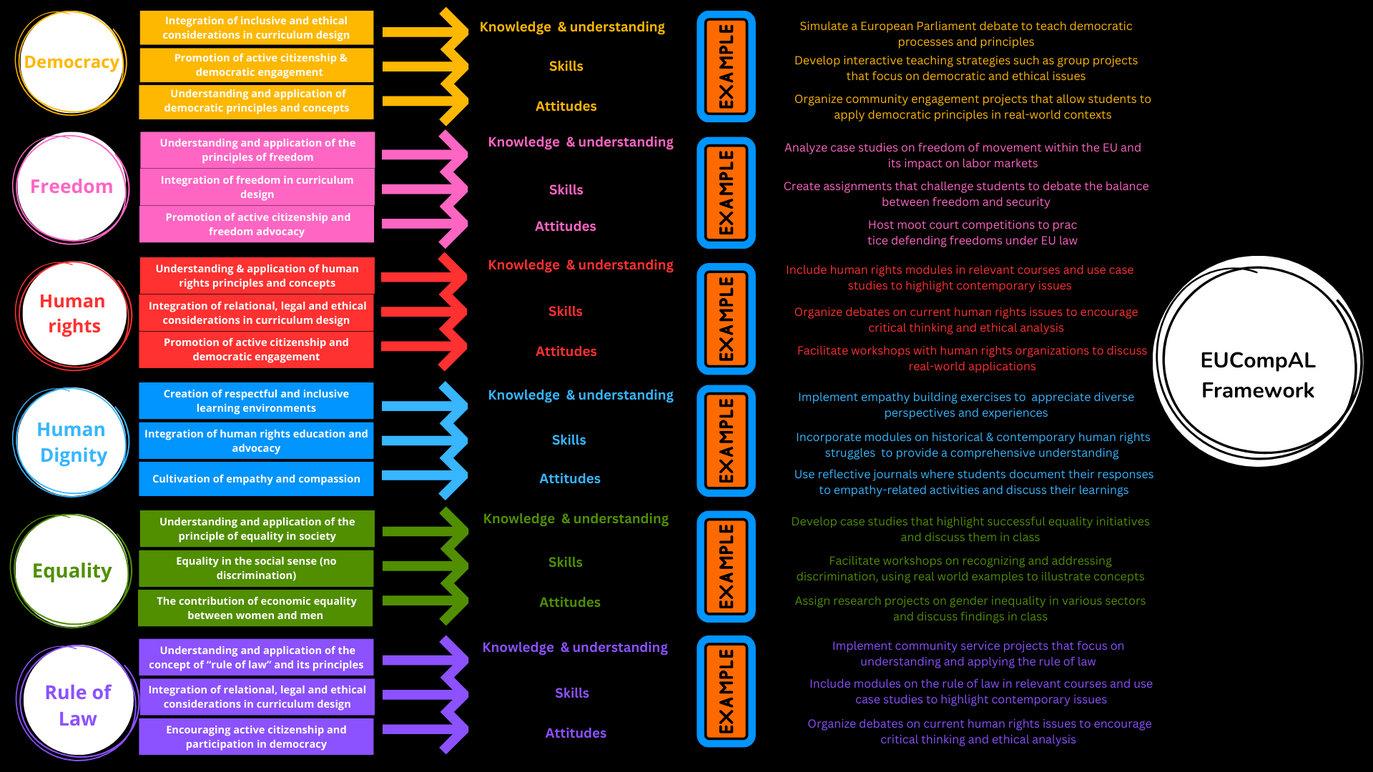




Competency-based framework designed to incorporate essential EU values into higher education curricula.
The objectives of this project result are the following:
- To conceptualize, prototype, and establish the EUCompAL framework aimed at fostering EU values within higher education pedagogy;
- To delineate and create an EU values-based academic profile; and
- To devise a professional trajectory for the development of an EU values-oriented profile for university instructors.
EUCompAL is designed to elucidate the application of EU values in the enhancement and innovation of higher education. This framework will draw inspiration from analogous instruments devised by the European Union and its agencies (e.g., DigComp, EntreComp, DigCompEdu, GreenComp, LifeComp), and it will be supported by vivid and motivational graphical illustrations.
Through the achievement of these objectives, this framework is set to foster a shared understanding of the essence of being an EU academic and the role of Higher Education Institutions (HEIs) within the EU in safeguarding European lifestyle and values. Its outcomes will enable the academic comprehension of the EU system and values to be methodically structured into uniform and assessable data, which can be quantified using a common metric, amplified and institutionalized, and leveraged for the career progression of academics.
The EUCompAL framework is integral to the overarching aim of the project, which is to enhance the quality and relevance of higher education programs, thereby fostering the personal and professional growth of students and graduates. This initiative stands as our contribution to the Education and Training Monitor 2014 by the European Commission, which advocates for educational institutions across Europe to equip individuals with the necessary skills for successful societal and labor market integration.
EUcompAL
Human dignity is untouchable. It must be honored and safeguarded, forming the true foundation of fundamental rights.
KNOWLEDGE, SKILLS & ATTITUDES
Knowledge: Understanding of the principles of 'Human Dignity', empathy, and cultural competence, as well as the impact of discrimination, harassment, and bias on individuals' dignity and well-being.
Skills: Ability to create and maintain a safe, supportive, and welcoming learning environment that fosters mutual respect, empathy, and understanding among students.
Attitudes: Commitment to promoting and protecting the dignity and rights of all individuals in academic settings, fostering a culture of respect, empathy, and inclusivity.
INDICATIVE EXAMPLE
Implement empathy-building exercises such as role-playing and reflective practices in classes to encourage students to appreciate diverse perspectives and experiences.
KNOWLEDGE, SKILLS & ATTITUDES
Knowledge: Understanding of human rights principles, frameworks, and mechanisms for protecting and promoting human dignity and rights, as well as the historical and contemporary struggles for human rights and social justice.
Skills: Ability to facilitate critical discussions, analyses, and actions related to human rights issues, encouraging students to examine root causes, explore solutions, and advocate for change.
Attitudes: Commitment to human rights principles, values, and ethics, as well as to using one's platform and privilege as an academic to advocate for the protection and promotion of human dignity and rights.
INDICATIVE EXAMPLE
Incorporate modules on historical and contemporary human rights struggles in relevant courses to provide a comprehensive understanding.
KNOWLEDGE, SKILLS & ATTITUDES
Knowledge: Understanding of the importance of empathy, compassion, and emotional intelligence in promoting human dignity, as well as the impact of empathy deficits on interpersonal relationships and societal cohesion.
Skills: Ability to facilitate empathy-building exercises, role-playing activities, and reflective practices that encourage students to step into others' shoes, recognize and validate diverse perspectives and experiences, and respond empathetically to others' needs and concerns.
Attitudes: Commitment to fostering a culture of empathy, compassion, and kindness in academic settings, as well as to modeling empathetic and compassionate behaviors in interactions with students, colleagues, and members of the academic community.
INDICATIVE EXAMPLE
Use reflective journals where students document their responses to empathy-related activities and discuss their learnings.
Equality ensures that all citizens have the same rights under the law. The principle of gender equality supports all European policies and is fundamental to European integration, applying across all sectors. The concept of equal pay for equal work was incorporated into the Treaty of Rome in 1957.
KNOWLEDGE, SKILLS & ATTITUDES
Knowledge: Deep understanding of the principles of equality as a fundamental value of a democratic society, awareness of the anchoring of equality in international legal documents in the European Union, in constitutional documents, anchoring of this principle in the Charter of Fundamental Rights and Freedoms or European Convention on Human Rights.
Skills: The ability to critically analyze and evaluate the documents on which democracy, and therefore equality, is based, to perceive and evaluate their overlap at the social science level, to develop and analyze case studies and teaching methodologies to ensure compliance with the principles of "equality in society".
Attitudes: Promote equality principles in the academic environment, support the legal environment, and apply equality approaches in everyday life.
INDICATIVE EXAMPLE
Develop case studies that highlight successful equality initiatives and discuss them in class.
KNOWLEDGE, SKILLS & ATTITUDES
Knowledge: Be able to define the concept of discrimination in legal and sociological terms. Find the correlation between discrimination and equality in terms of the historical development of society.
Skills: Develop the ability to make decisions in favor of equal rights and opportunities for all members of society, critically and to analyze and evaluate documents and case studies.
Attitudes: Apply the principle of equality in everyday life, applying rights and opportunities for all members of society without discrimination based on social status, age, gender, ethnicity, etc.
INDICATIVE EXAMPLE
Facilitate workshops on recognizing and addressing discrimination, using real-world examples to illustrate concepts.
KNOWLEDGE, SKILLS & ATTITUDES
Knowledge: To be aware first of the state of gender inequality in the economic sphere. To be able to draw on specific data and be able to analyze and evaluate it. Find and provide students with relevant literature and the latest statistics.
Skills: Identify and analyze the reasons and consequences of the gender pay gap, the differences in access to education, labor market activities, etc. Develop an analysis of improving gender equality in the labor market.
Attitudes: To perceive generational differences as a whole, to contribute to the promotion of economic equality in the academic environment.
INDICATIVE EXAMPLE
Assign research projects on gender inequality in various sectors and discuss findings in class.
The EU operates on the principles of representative democracy, granting political rights to its citizens automatically. Every adult EU citizen has the right to run for office and vote in European Parliament elections. Additionally, they can stand as candidates and vote either in their country of residence or their country of origin.
KNOWLEDGE, SKILLS & ATTITUDES
Knowledge: Profound understanding of the democratic foundations, principles, and concepts within the European Union, including its historical development, key legal frameworks, and implications for governance and civil rights.
Skills: Ability to critically analyze and evaluate academic content, case studies, and teaching methodologies to ensure alignment with democratic values.
Attitude: Commitment to upholding and promoting democracy in academic settings, fostering an environment of political literacy, respect for democratic norms, and civic responsibility among students.
INDICATIVE EXAMPLE
Simulate a European Parliament debate to teach democratic processes and principles.
KNOWLEDGE, SKILLS & ATTITUDES
Knowledge: Understanding of curriculum design principles, pedagogical theories, and best practices for integrating democratic and ethical considerations into teaching and learning.
Skills: Ability to design and implement inclusive and interactive teaching strategies, learning activities, and assessments that promote political literacy, critical thinking, and ethical decision-making.
Attitudes: Openness to innovation and adaptability in curriculum design and pedagogical approaches to effectively embed democratic and ethical considerations.
INDICATIVE EXAMPLE
Develop interactive teaching strategies such as group projects that focus on democratic and ethical issues.
KNOWLEDGE, SKILLS & ATTITUDES
Knowledge: Understanding of the role of Democracy in governance, the protection of human rights, and the promotion of social justice and equality within the European Union.
Skills: Ability to design and implement educational initiatives, learning activities, and community engagement projects that encourage students to explore, understand, and apply the principles of Democracy in real-world contexts and promote democratic participation and civic responsibility.
Attitudes: Commitment to fostering a culture of active citizenship, democratic engagement, and civic responsibility among students, promoting ethical conduct, respect for democratic norms, and a commitment to upholding and promoting Democracy in academic settings and beyond.
INDICATIVE EXAMPLE
Organize community engagement projects that allow students to apply democratic principles in real-world contexts.
Freedom of movement grants citizens the right to travel and live freely within the Union. The EU Charter of Fundamental Rights safeguards individual liberties, including privacy, freedom of thought, religion, assembly, expression, and information.
KNOWLEDGE, SKILLS & ATTITUDES
Knowledge: Understanding of the conceptual underpinnings and legal frameworks related to freedom in the EU, including pertinent articles of the EU Charter of Fundamental Rights and the Treaty on the Functioning of the European Union.
Skills: Ability to critically analyze and integrate concepts of freedom into academic content, exploring both its protections and limitations within the EU.
Attitudes: Commitment to fostering respect for freedom as a fundamental EU value, encouraging an environment that supports open dialogue and respect for diverse opinions.
INDICATIVE EXAMPLE
Analyze case studies on freedom of movement within the EU and its impact on labor markets.
KNOWLEDGE, SKILLS & ATTITUDES
Knowledge: Understanding of how to structure curricula that reflect the diverse aspects of freedom, recognizing its interdependence with other EU values like democracy and rule of law.
Skills: Capability to design educational activities that enable students to explore freedom’s practical implications, such as through the analysis of freedom of movement and its impact on EU labor markets.
Attitudes: Encouraging a critical approach to freedom, where students are motivated to explore how freedom can coexist with other societal needs such as security and public order.
INDICATIVE EXAMPLE
Create assignments that challenge students to debate the balance between freedom and security.
KNOWLEDGE, SKILLS & ATTITUDES
Knowledge: Deep understanding of the mechanisms through which freedoms can be protected and challenged within the EU, such as through the European Court of Justice or public advocacy.
Skills: Ability to foster skills in advocacy and legal interpretation, empowering students to become defenders of freedom.
Attitudes: Cultivating a commitment among students to value and protect freedom, recognizing its essential role in maintaining a democratic and just society.
INDICATIVE EXAMPLE
Host moot court competitions to practice defending freedoms under EU law.
The EU is founded on the rule of law, with all its actions based on treaties that are voluntarily and democratically agreed upon by its member countries. An independent judiciary upholds law and justice. The European Court of Justice holds final jurisdiction, and its rulings must be respected by all member states.
KNOWLEDGE, SKILLS & ATTITUDES
Knowledge: Deep understanding of the legal foundations, principles, and concepts of the 'Rule of Law' in the European Union, including its historical development, key legal frameworks, and implications for democratic governance and human rights.
Skills: Ability to critically analyze and evaluate academic content, case studies, and teaching methodologies to ensure alignment with the 'Rule of Law'.
Attitudes: Commitment to upholding and promoting the 'Rule of Law' in academic settings, fostering an environment of legal literacy, respect for law, and civic responsibility among students.
INDICATIVE EXAMPLE
Use case studies on landmark EU legal decisions to illustrate the rule of law in practice.
KNOWLEDGE, SKILLS & ATTITUDES
Knowledge: Understanding of curriculum design principles, pedagogical theories, and best practices for integrating legal and ethical considerations related to the 'Rule of Law' into teaching and learning.
Skills: Ability to design and implement inclusive and interactive teaching strategies, learning activities, and assessments that promote legal literacy, critical thinking, and ethical decision-making.
Attitudes: Openness to innovation and adaptability in curriculum design and pedagogical approaches to effectively embed legal and ethical considerations related to the 'Rule of Law'.
INDICATIVE EXAMPLE
Develop interactive assignments that require students to solve legal and ethical dilemmas.
KNOWLEDGE, SKILLS & ATTITUDES
Knowledge: Understanding of the role of the 'Rule of Law' in democratic governance, the protection of human rights, and the promotion of social justice and equality within the European Union.
Skills: Ability to design and implement educational initiatives, learning activities, and community engagement projects that encourage students to explore, understand, and apply the principles of the 'Rule of Law' in real-world contexts and promote democratic participation and civic responsibility.
Attitudes: Commitment to fostering a culture of active citizenship, democratic engagement, and civic responsibility among students, promoting ethical conduct, respect for law, and a commitment to upholding and promoting the 'Rule of Law' in academic settings and beyond.
INDICATIVE EXAMPLE
Develop interactive assignments that require students to solve legal and ethical dilemmas.
Human rights are safeguarded by the EU Charter of Fundamental Rights, which includes protection against discrimination based on sex, racial or ethnic origin, religion or belief, disability, age, or sexual orientation. The Charter also ensures the right to personal data protection and access to justice.
KNOWLEDGE, SKILLS & ATTITUDES
Knowledge: To develop an in-depth understanding of the principles and legal foundations of "human rights" in the EU, taking into account the historical development, first intellectually and then in the framework of positive legal instruments, the main national and international instruments and the interaction with other values of the EU.
Skills: To develop the ability to critically analyse 'Human Rights' discourses and documents in the context of academic content, case studies and teaching methodologies.
Attitudes: A commitment to promote and promote 'Human Rights' in academic settings, to promote respect for human rights among students and to promote the struggle to protect and promote human rights.
INDICATIVE EXAMPLE
Include human rights modules in relevant courses and use case studies to highlight contemporary issues.
KNOWLEDGE, SKILLS & ATTITUDES
Knowledge: Understanding of curriculum design principles, pedagogical theories and best practices for integrating legal and ethical considerations of 'human rights' into teaching and learning.
Skills: Ability to design and implement inclusive and interactive teaching strategies, learning activities and assessments that promote legal literacy, critical thinking and ethical decision-making.
Attitudes: Openness to innovation and adaptability in curriculum design and pedagogical approaches to effectively embed legal and ethical considerations related to 'Human Rights'.
INDICATIVE EXAMPLE
Organize debates on current human rights issues to encourage critical thinking and ethical analysis.
KNOWLEDGE, SKILLS & ATTITUDES
Knowledge: Understanding the role of 'human rights' in democratic governance and in promoting social justice and equality within the European Union.
Skills: Ability to design and implement educational initiatives, learning activities and community engagement projects that encourage learners to explore, understand and apply the principles of 'Human Rights' in real-world contexts and promote democratic participation and civic responsibility.
Attitudes: A commitment to promote a culture of active citizenship, democratic participation and civic responsibility among students, to protect and promote ethical behaviour, respect for the law and 'Human Rights' in academic settings and beyond.
INDICATIVE EXAMPLE
Facilitate workshops with human rights organizations to discuss real-world applications.
Illustration of the EUCompAL framework

Massive Open Online Course (MOOC) tailored for higher education instructors, focusing on the integration of EU values into their pedagogical methods.
The specific objectives of this project result are the following:
- To conceive and construct a pedagogical framework based on informed approaches for weaving EU values into university instruction.
- To generate and provide resources, including guidelines and templates, to assist course developers in the creation of Massive Open Online Courses (MOOCs).
- To formulate and implement learning materials, such as readings, videos, and assessments, aligned with the established pedagogical paradigm.
- To propagate the MOOC across academic communities and networks throughout Europe, enhancing its visibility and impact.
This MOOC is foreseen to have several contributions:
- Embodying the foundational values of democracy, human rights, and the rule of law, the EU stands as a beacon of these principles. This MOOC, by integrating EU values into university pedagogy, equips lecturers with the tools to inculcate these values in their students, thereby nurturing responsible and engaged EU citizens.<o:p></o:p>
- The incorporation of EU values into academic teaching not only enriches students' critical thinking skills but also deepens their comprehension of the EU's intricate challenges. It encourages students to engage with a variety of perspectives and information sources critically.
- Embedding EU values in educational practices promotes an appreciation for the rich tapestry of student backgrounds, cultures, and beliefs, thereby fostering an inclusive academic atmosphere. This initiative aims to cultivate mutual respect and understanding among students and among lecturers from diverse backgrounds and cultures.
- The participating institutions have outlined strategic objectives emphasizing global citizenship and social responsibility. By developing a MOOC focused on EU values, these institutions can further their goals, showcasing a commitment to upholding and disseminating the core values of the EU.
Digital self-assessment tool for higher education instructors to appraise the incorporation of EU values in their teaching approaches.
The third project result is designed to guide university lecturers and academics through the process of familiarizing themselves with EU values and incorporating them into their professional activities, particularly within their pedagogical practices. Its objectives are the following:
- Facilitating opportunities for university lecturers to reflect on the significance of integrating EU values into their teaching methodologies.
- Providing evidence to university lecturers on the extent to which EU values have been incorporated into their teaching practices.
- Assisting university lecturers in identifying potential areas for improvement in the integration of EU values into their teaching.
- Offering university lecturers access to standards, recommendations, and best practices for embedding EU values into their teaching methodologies.
The digital self-reflection tool serves as a resource for lecturers to contemplate the role of universities within the EU framework and conversely. In preparation for this initiative, consortium partners reviewed several key policy documents, including the "White Paper on the Future of Europe: Reflections and scenarios for the EU27 by 2025" by the European Commission (2017), highlighting the pivotal role of higher education in perpetuating EU values.
The digital self-reflection tool aims to enhance lecturers' awareness of this critical function. This tool is structured to support lecturers in navigating and enriching their roles and practices as EU academics, offering flexibility in the amount of time and effort invested. It is crafted to foster reflection, not for evaluative or accountability measures. Through introspection on personal strengths and areas for development, followed by strategic planning for improvement, lecturers can achieve professional growth. Consequently, this third project result plays a vital role in strengthening the higher education sector's contribution to promoting EU values and the European way of life.
The project benefits from the guidance of an external advisory board, comprising experts in EU studies and education sciences, who are entrusted with ensuring the quality of the project's outcomes. The advisory board includes the following members:
Prof. Argyris Passas (Greece). Professor Emeritus in State Administration & European Integration, Panteion University of Athens. Jean Monnet Chair "Public administration & European Integration”
Prof. Maria Eliophotou (Cyprus). Professor in Education. University of Cyprus.
Prof. Cagnur Kaytmaz Balsari (Türkiye). Dean, Faculty of Business at Dokuz Eylul University.
Dr. Dimitrios Bouris (the Netherlands). Associate Professor at the Department of Political Science at the University of Amsterdam. Jean Monnet Chair "The EU as a Global Actor" (ATHENA).
Dr. Mirko Forti (Italy). Research Fellow in European and International Law at the Università degli Studi della Tuscia.
Querci, I. & Vlachopoulos, D. (2023). Editorial: a shared reflection on how to innovate Higher Education through the embedment of EU values in teaching and learning practice. CRSL Innovation Journal, 1(2). https://www.innovationjournal.science/index.php/crsl-innovation-journal/article/view/20








